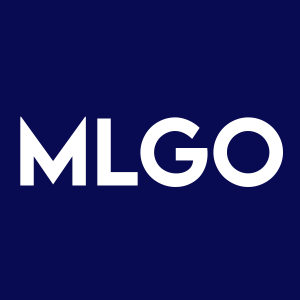MicroAlgo Inc. Develops Classifier Auto-Optimization Technology Based on Variational Quantum Algorithms, Accelerating the Advancement of Quantum Machine Learning
Rhea-AI Summary
Positive
- Introduction of Adaptive Circuit Pruning reduces computational complexity while preserving classifier performance
- Hamiltonian Transformation Optimization decreases computational complexity by at least an order of magnitude
- Novel Quantum Entanglement Regularization prevents model overfitting and improves generalization
- Implementation of Variational Quantum Error Correction enhances reliability in noisy environments
Negative
- Technology still faces challenges in practical applications due to current quantum hardware limitations
- Performance in real-world quantum computing environments remains to be proven
- Requires further advancement in quantum computing hardware for broader application
News Market Reaction – MLGO
On the day this news was published, MLGO declined 10.06%, reflecting a significant negative market reaction.
Data tracked by StockTitan Argus on the day of publication.
Traditional quantum classifiers can theoretically leverage the advantages of quantum computing to accelerate machine learning tasks, but they still face numerous challenges in practical applications. Firstly, current mainstream quantum classifiers often require deep quantum circuits to achieve efficient feature mapping, which results in high optimization complexity for quantum parameters during training. Additionally, as the volume of training data increases, the computational load for parameter updates grows rapidly, leading to prolonged training times and impacting the model's practicality.
MicroAlgo's classifier auto-optimization technology significantly reduces computational complexity through deep optimization of the core circuit. This approach improves upon two key aspects: circuit design and optimization algorithms. In terms of circuit design, the technology adopts a streamlined quantum circuit structure, reducing the number of quantum gates and thereby lowering the consumption of computational resources. On the optimization algorithm front, this classifier auto-optimization model employs an innovative parameter update strategy, making parameter adjustments more efficient and substantially accelerating training speed.
In the training process of classifiers based on variational quantum algorithms (VQA), parameter optimization is one of the most critical steps. Generally, VQA classifiers rely on Parameterized Quantum Circuits (PQC), where updating each parameter requires computing gradients to adjust the circuit structure and minimize the loss function. However, the deeper the quantum circuit, the more complex the parameter space becomes, requiring optimization algorithms to perform more iterations to achieve convergence. Furthermore, uncertainties and noise in quantum measurements can also affect the training process, making it difficult for the model to optimize stably.
Traditional optimization methods often employ strategies such as Stochastic Gradient Descent (SGD) or Variational Quantum Natural Gradient (VQNG) to find optimal parameters. However, these methods still face challenges such as high computational complexity, slow convergence rates, and a tendency to get trapped in local optima. Therefore, reducing the computational burden of parameter updates and improving training stability have become key factors in enhancing the performance of VQA classifiers.
MicroAlgo's classifier auto-optimization technology, based on variational quantum algorithms, significantly reduces the computational complexity of parameter updates through deep optimization of the core circuit. It also incorporates innovative regularization techniques to enhance the stability and generalization capability of the training process. The core breakthroughs of this technology include the following aspects:
Depth Optimization of Quantum Circuits to Reduce Computational Complexity: In traditional VQA classifier designs, the number of layers in the quantum circuit directly impacts computational complexity. To lower computational costs, MicroAlgo employs an Adaptive Circuit Pruning (ACP) method during optimization. This approach dynamically adjusts the circuit structure, eliminating redundant parameters while preserving the classifier's expressive power. As a result, the number of parameters required during training is significantly reduced, leading to a substantial decrease in computational complexity.
Hamiltonian Transformation Optimization (HTO): Additionally, MicroAlgo introduces an optimization method based on Hamiltonian transformations. By altering the Hamiltonian representation of the variational quantum circuit, this technique shortens the search path within the parameter space, thereby improving optimization efficiency. Experimental results demonstrate that this method can reduce computational complexity by at least an order of magnitude while maintaining classification accuracy.
Novel Regularization Strategy to Enhance Training Stability and Generalization Capability: In classical machine learning, regularization methods are widely used to prevent model overfitting. In the realm of quantum machine learning, MicroAlgo introduces a novel quantum regularization strategy called Quantum Entanglement Regularization (QER). This method dynamically adjusts the strength of quantum entanglement during training, preventing the model from overfitting the training data and thereby improving the classifier's generalization ability on unseen data.
Additionally, an optimization strategy based on the Energy Landscape is incorporated, which adjusts the shape of the loss function during training. This enables the optimization algorithm to more quickly identify the global optimum, reducing the impact of local optima.
Enhanced Noise Robustness for Real Quantum Computing Environments: Given that current Noisy Intermediate-Scale Quantum (NISQ) devices still exhibit significant noise levels, a model's noise resilience is critical. To improve the classifier's robustness, MicroAlgo proposes a technique based on Variational Quantum Error Correction (VQEC). This method actively learns noise patterns during training and adjusts circuit parameters to mitigate noise effects. This strategy markedly enhances the classifier's stability in noisy environments, making its performance on real quantum devices more reliable.
MicroAlgo's classifier auto-optimization technology, based on variational quantum algorithms, successfully reduces the computational complexity of parameter updates through deep optimization of the core circuit and the introduction of novel regularization methods. This approach significantly boosts training speed and generalization capability. This breakthrough technology not only demonstrates its effectiveness in theory but also exhibits superior performance in simulation experiments, laying a crucial foundation for the advancement of quantum machine learning.
As quantum computing hardware continues to advance, this technology will further expand its application domains in the future, accelerating the practical implementation of quantum intelligent computing and propelling quantum computing into a new stage of real-world utility. In an era where quantum computing and artificial intelligence converge, this innovation will undoubtedly serve as a significant milestone in advancing the frontiers of technology.
About MicroAlgo Inc.
MicroAlgo Inc. (the "MicroAlgo"), a Cayman Islands exempted company, is dedicated to the development and application of bespoke central processing algorithms. MicroAlgo provides comprehensive solutions to customers by integrating central processing algorithms with software or hardware, or both, thereby helping them to increase the number of customers, improve end-user satisfaction, achieve direct cost savings, reduce power consumption, and achieve technical goals. The range of MicroAlgo's services includes algorithm optimization, accelerating computing power without the need for hardware upgrades, lightweight data processing, and data intelligence services. MicroAlgo's ability to efficiently deliver software and hardware optimization to customers through bespoke central processing algorithms serves as a driving force for MicroAlgo's long-term development.
Forward-Looking Statements
This press release contains statements that may constitute "forward-looking statements." Forward-looking statements are subject to numerous conditions, many of which are beyond the control of MicroAlgo, including those set forth in the Risk Factors section of MicroAlgo's periodic reports on Forms 10-K and 8-K filed with the SEC. Copies are available on the SEC's website, www.sec.gov. Words such as "expect," "estimate," "project," "budget," "forecast," "anticipate," "intend," "plan," "may," "will," "could," "should," "believes," "predicts," "potential," "continue," and similar expressions are intended to identify such forward-looking statements. These forward-looking statements include, without limitation, MicroAlgo's expectations with respect to future performance and anticipated financial impacts of the business transaction.
MicroAlgo undertakes no obligation to update these statements for revisions or changes after the date of this release, except as may be required by law.
SOURCE Microalgo.INC







